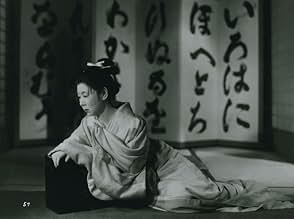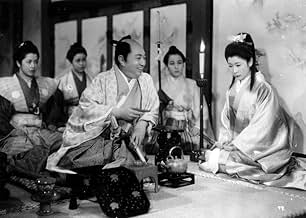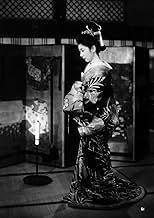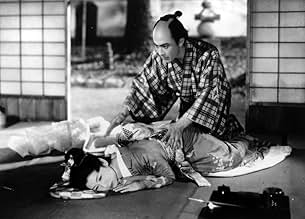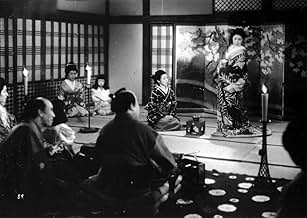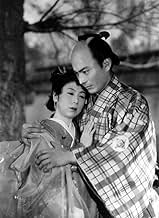IMDb-BEWERTUNG
8,1/10
8081
IHRE BEWERTUNG
Folgt dem Kampf und dem Überleben einer Frau inmitten der Wechselfälle des Lebens und der Grausamkeit der Gesellschaft.Folgt dem Kampf und dem Überleben einer Frau inmitten der Wechselfälle des Lebens und der Grausamkeit der Gesellschaft.Folgt dem Kampf und dem Überleben einer Frau inmitten der Wechselfälle des Lebens und der Grausamkeit der Gesellschaft.
- Regie
- Drehbuch
- Hauptbesetzung
- Auszeichnungen
- 2 Gewinne & 1 Nominierung insgesamt
Akira Oizumi
- Manager Bunkichi
- (as Hiroshi Oizumi)
Empfohlene Bewertungen
It was sickening to witness how Ohara was treated by the noble men of high rank and even by her father. She is a strong and proud woman, but she has a series of misfortunes of things she could not very well control herself. Because of her looks, her pride and her birth she is put, mostly by force, into various agreements that are disgrading and she meets little compassion.
That said, as this is based on a novel by Iharu Saikaku, it has strong tendencies towards being epic in approach. This is not a bad thing, but it takes on being a fairytale almost instead of gaining credibility like say 'Donzoko' by Kurosawa. For emotional impact Mizoguchi is an absolute master however and this tragic tale could not be outdone by any other.
That said, as this is based on a novel by Iharu Saikaku, it has strong tendencies towards being epic in approach. This is not a bad thing, but it takes on being a fairytale almost instead of gaining credibility like say 'Donzoko' by Kurosawa. For emotional impact Mizoguchi is an absolute master however and this tragic tale could not be outdone by any other.
I finally saw Life of Oharu at the Ontario Cinematheque in Toronto last night and what an amazing film it was.
I don't know why I held out on Mizoguchi for so long. I think it's because I watched a lot of Ozu in the day and expected more of the same heavily restrained, obliquely symbolic style which is often as alienating as it is inventive. I couldn't have been further off the mark. Mizoguchi's style is fluid and assured like Hitchcock and Bresson. He also injects a warmth of spirit and shows a genuine interest in storytelling which is often absent in much of Ozu's ouevre.
The Story of Oharu is a treatise on how women are economically exploited in a patriarchal society. This is probably one of the greatest 'women's films' ever made. It ranks above 'Breaking The Waves' and Sirk's 'Imitation of Life'. No small feat!! If you like stories that actually say something about the world in which we live, I would strongly recommend this film. It's a masterpiece of world cinema. I am definitely going to see more Mizoguchi.
I don't know why I held out on Mizoguchi for so long. I think it's because I watched a lot of Ozu in the day and expected more of the same heavily restrained, obliquely symbolic style which is often as alienating as it is inventive. I couldn't have been further off the mark. Mizoguchi's style is fluid and assured like Hitchcock and Bresson. He also injects a warmth of spirit and shows a genuine interest in storytelling which is often absent in much of Ozu's ouevre.
The Story of Oharu is a treatise on how women are economically exploited in a patriarchal society. This is probably one of the greatest 'women's films' ever made. It ranks above 'Breaking The Waves' and Sirk's 'Imitation of Life'. No small feat!! If you like stories that actually say something about the world in which we live, I would strongly recommend this film. It's a masterpiece of world cinema. I am definitely going to see more Mizoguchi.
As this film opens, Oharu (Kinuyo Tanaka), a 50 year old prostitute, goes into a Buddhist temple and looks back at her life. We see that she was once loved, but because her young suitor (the great Toshiro Mifune) was of a lower caste, it was forbidden, resulting in her being banished and him being beheaded. As her family has been shamed, her father jumps on the chance to send her to a local Lord who is looking for a mistress who can be a surrogate mother. Unfortunately, she's abruptly dismissed after bearing him a son, and from there she steadily declines. The film was highly personal to director Kenji Mizoguchi since his own sister (who had raised him) was sold by their father to be a geisha, which is one of the things that happens to Oharu.
Like 'Ugetsu', the film Mizoguchi made the following year, 'The Life of Oharu' is a morality tale, and while it's less heavy-handed than 'Ugetsu', it is fairly melodramatic. The central message is one of Buddhist compassion, and not just for those who we know have had a sad, unfair life – but also those who appear derelict or decrepit to us, and who we might otherwise judge, not knowing what they've experienced. While there is depth to that message, and it's certainly nice seeing a film that empathizes with woman and the misogyny they endure, 'The Life of Oharu' is dark and hard to watch for 148 minutes. The plot is quite linear and we see her used and abused in every single societal role she plays: daughter, lover, concubine, courtesan, wife, nun, and common prostitute. I also don't think Tanaka was well utilized in this role – she simply doesn't look young enough in early scenes, or old enough in later scenes. The filmmaking is good and the film has a solid place in film history for its message, but it's too bleak, and too simplistically so, for a film of this length.
Like 'Ugetsu', the film Mizoguchi made the following year, 'The Life of Oharu' is a morality tale, and while it's less heavy-handed than 'Ugetsu', it is fairly melodramatic. The central message is one of Buddhist compassion, and not just for those who we know have had a sad, unfair life – but also those who appear derelict or decrepit to us, and who we might otherwise judge, not knowing what they've experienced. While there is depth to that message, and it's certainly nice seeing a film that empathizes with woman and the misogyny they endure, 'The Life of Oharu' is dark and hard to watch for 148 minutes. The plot is quite linear and we see her used and abused in every single societal role she plays: daughter, lover, concubine, courtesan, wife, nun, and common prostitute. I also don't think Tanaka was well utilized in this role – she simply doesn't look young enough in early scenes, or old enough in later scenes. The filmmaking is good and the film has a solid place in film history for its message, but it's too bleak, and too simplistically so, for a film of this length.
Deeply tragic and sad tale that is nevertheless presented to us with great dignity and style. A tale of the harshness of feudal Japan and the way the men treat the women is unfortunately not without its echo, even today in that great country. A woman here, originally of noble beginnings, makes bad, then good, then more and more bad and none of it of her making. She is simply the result in men's dealings and hypocrisies. Still beautiful to look at though with the magical camera-work and immaculate direction. Some slight confusions at first until we realise that time jumps at the blink of an eye and before we know it one period has slid effortlessly into another, where inevitably another tragedy awaits our fallen heroine.
'The Life of Oharu' is not an easy film to watch. There is barely even a fleeting moment of joy/happiness and towards the end, the viewer will find himself/herself getting really angry and outraged by the unthinkable oppression and atrocities and engulf our titular protagonist. Mizoguchi's sympathetic treatment of Oharu compels the viewer to feel beaten down and horrified by Oharu's miserable plight.
The long line of tragedies in Oharu's life gets triggered by her decision to fall in love with Katsunosuke(played by the legendary Toshirô Mifune), a man of lower social standing. This element of forbidden love was also present in the previous Mizoguchi film that I watched namely 'The Story of Last Chrysanthemum'. The story arc of Otoku in that film to a some extent resembles the arc of Oharu in this one in terms of the mental and physical torture that they are both subjected to. Oharu makes an effort to conform to society's deplorable expectations, but even then gets nothing to show for it and gets discarded. This is because once she falls in social standing and gets sold off by her family, she ceases to be a human being in the eyes of society. There is a lot of references to trade and business in 'The Life of Oharu' which is relevant because Oharu over the course of her life becomes nothing more than a commodity to be sold from one customer to the next in the patriarchal society of 17th century Japan.
Mizoguchi technical mastery is again on show in 'The Life of Oharu'. Some of the long takes and extended tracking shots are truly remarkable. Mizoguchi had the ability to suggest a plethora of things like passage of time, a change in mood, etc. with one little pan movement of the camera or with just the camera placement and those features are on show here too. The interior sets are beautifully designed and the haunting music by Ichirō Saitō is used craftily from time to time to set/change the mood. Kinuyo Tanaka has to be admired for lending the sympathy inducing tender innocence to Oharu. Her performance in the scenes depicting the later stages of Oharu's life is jaw-dropping in its authenticity and humanity.
To conclude, I have to reiterate that 'The Life of Oharu' is not for everyone. One has to be in a specific mood to be able to endure the emotionally crushing narrative and storytelling of the film. But having said that, I still believe that it needs to be watched as Oharu represents numerous women(of Japan and beyond) in history and present times whose lives were and are still getting destroyed due to an oppressive society which denigrates women. It is said that Mizoguchi's obsession with capturing the misery of women in the face of oppression had its roots in his own childhood as his own sister who raised him was sold by their father. One can sense a personal grief, a personal intimacy in the style of storytelling in this particular film. Highly Recommended.
The long line of tragedies in Oharu's life gets triggered by her decision to fall in love with Katsunosuke(played by the legendary Toshirô Mifune), a man of lower social standing. This element of forbidden love was also present in the previous Mizoguchi film that I watched namely 'The Story of Last Chrysanthemum'. The story arc of Otoku in that film to a some extent resembles the arc of Oharu in this one in terms of the mental and physical torture that they are both subjected to. Oharu makes an effort to conform to society's deplorable expectations, but even then gets nothing to show for it and gets discarded. This is because once she falls in social standing and gets sold off by her family, she ceases to be a human being in the eyes of society. There is a lot of references to trade and business in 'The Life of Oharu' which is relevant because Oharu over the course of her life becomes nothing more than a commodity to be sold from one customer to the next in the patriarchal society of 17th century Japan.
Mizoguchi technical mastery is again on show in 'The Life of Oharu'. Some of the long takes and extended tracking shots are truly remarkable. Mizoguchi had the ability to suggest a plethora of things like passage of time, a change in mood, etc. with one little pan movement of the camera or with just the camera placement and those features are on show here too. The interior sets are beautifully designed and the haunting music by Ichirō Saitō is used craftily from time to time to set/change the mood. Kinuyo Tanaka has to be admired for lending the sympathy inducing tender innocence to Oharu. Her performance in the scenes depicting the later stages of Oharu's life is jaw-dropping in its authenticity and humanity.
To conclude, I have to reiterate that 'The Life of Oharu' is not for everyone. One has to be in a specific mood to be able to endure the emotionally crushing narrative and storytelling of the film. But having said that, I still believe that it needs to be watched as Oharu represents numerous women(of Japan and beyond) in history and present times whose lives were and are still getting destroyed due to an oppressive society which denigrates women. It is said that Mizoguchi's obsession with capturing the misery of women in the face of oppression had its roots in his own childhood as his own sister who raised him was sold by their father. One can sense a personal grief, a personal intimacy in the style of storytelling in this particular film. Highly Recommended.
Wusstest du schon
- WissenswertesThis film, which was director Kenji Mizoguchi's dream project, was severely under-financed, and the production was forced to use a warehouse instead of a regular sound stage. This warehouse happened to be located near railways, and each time a train passed by, they had to stop shooting, which made the shooting of the film even more difficult with the director's obsessive use of long, continuous, uninterrupted takes. The same warehouse was also used for Josef Von Sternberg's film 'The Saga of Anatahan'.
- Zitate
Katsunosuke: Lady Oharu, a human being - no, woman - can only be happy if she marries for love. Rank and money don't mean happiness.
- Crazy CreditsOpening credits shown over Japanese artwork/water-colors.
- VerbindungenFeatured in Die geheimnisvolle Sekte (1978)
Top-Auswahl
Melde dich zum Bewerten an und greife auf die Watchlist für personalisierte Empfehlungen zu.
- How long is The Life of Oharu?Powered by Alexa
Details
Box Office
- Weltweiter Bruttoertrag
- 6.921 $
- Laufzeit
- 2 Std. 28 Min.(148 min)
- Farbe
- Sound-Mix
- Seitenverhältnis
- 1.37 : 1
Zu dieser Seite beitragen
Bearbeitung vorschlagen oder fehlenden Inhalt hinzufügen

